
by Purnima Ramakrishnan | Dec 2, 2013 | Award, Childhood, Competition, Education, India, Inspirational, International, Kids, Life Balance, Life Lesson, Motherhood, Parenting, Purnima, The Alchemist, World Moms Blog, World Motherhood, Younger Children
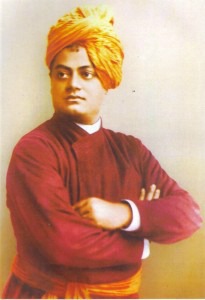
“Education is the manifestation of the perfection already in man – Swami Vivakananda”
Sometime back I wrote about Abraham Lincoln’s letter to his son’s school teacher and my perspective and how it was appropriate for our lives here too. To bring up a good human being and to help him/her learn and get educated is the role of the parent and also the teacher at school.
Well, there were these competitions going on in my seven year old son’s school again, here, in India. This time it was Western Music. I am so fond of these musicals. My son sang some of my favorites and then Que Sara Sara and Rudolph the red nosed reindeer. He continued to the preliminaries, quarter finals, semi-finals and the finals. But one day while preparing for the finals at home, my son suddenly said, “Not all are going to win.”
I said, “Yes, they are not. But if you want to win, you need to practise.”
He was not the type of person who was interested to sing, but the type who loved to listen to music and songs. And I discovered this during this time.
“But amma, I don’t care.”
“Well, you should do your best. And then if you don’t get to win, that is fine. But you should not just give up.”
“I am not giving up. I just don’t want to sing.”
“Oh?”
Well, I was at a loss of words. I did not want him to do something he did not want to do. But then we were already into the finals, and I thought was it not a sheer waste if he did not even participate? This got me thinking…
The next day I found this quote in his school’s website.
Education is the manifestation of the perfection already in man – Swami Vivakananda.
We send our children to school for education and the teachers and parents are loving and affectionate and try to encourage the children to imbibe knowledge.
But then, what do they actually learn? Only what they chose to!
And also, sometimes they don’t learn and at other times they are very smart in academics. They also indulge in sports and other extra-curricular activities. We are happy, sometimes sad, and at times indifferent to various achievements, successes and failures and mediocre performances of our children. So many choices, actions, results, and yet Swami Vivekananda says we are all perfect.
If everyone is perfect, then where are the gaps? Why do only some people win? Why are there so many differences and scales of grades? ‘Manifestation’ is the significant word. What manifests out of a child is important. And whatever manifests, the society, the parents and the teachers are responsible to some extent. And then the children themselves are finally responsible. We bring up a child, giving him a lot of room to explore, think, discover and find joy, and, thereby, allow him to manifest his perfection.
I did not ask him to practise a lot for the singing competition. If he is not interested, let him not be. Maybe he is interested in building robots. Maybe he is interested in literary pursuits. Maybe he is interested in astronomy when he points out the pole star and Venus.
Because he is talented to sing, does not mean he should want to do it or become the next pop star. Whatever he allows to be manifested from himself, only will be, and I cannot force it.
And the reason for what he focuses on, no one can understand. It is his own mind acting under his own will and there are no explanations for that. So, let me not put a restraint to the manifestation of his perfection. Let him lay down his own options and channel his own interests.
In the end, he did end up participating in the finals, but without practising and the results are not out! But I shouldn’t care about the results because he doesn’t, right?
Is your child exercising independence in what he wants to do in life and what he wants to achieve? If so, are they different from what you think? And how do you handle it?
This is an original post to World Moms Blog by Purnima, our Indian mother writing from Chennai, India. Her contributions to the World Moms Blog can be found here. She also rambles at The Alchemist’s Blog.
Photo credit to Wiki Media Commons.
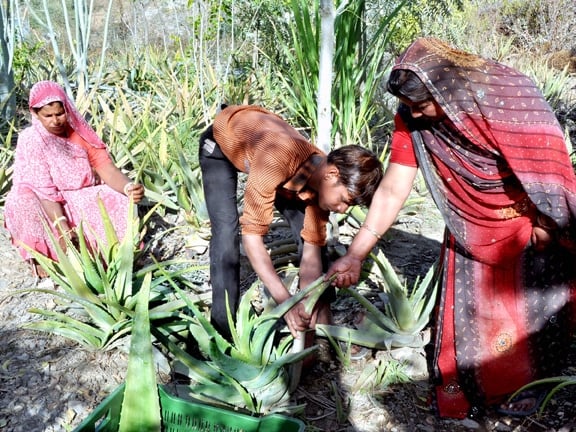
by Purnima Ramakrishnan | Jul 23, 2013 | Casting a Wider Net, Economy, Education, Feminism, Government, Human Rights, Humanity, India, Inspirational, International, Motherhood, Nature, Purnima, Social Good, The Alchemist, United Nations, Women's Rights, World Moms Blog, World Voice
A couple of weeks ago, we featured a remote village, Piplantri (Western India) on the Gates Foundation. Piplantri is a model village, whose actions of change have been very well received all over India.
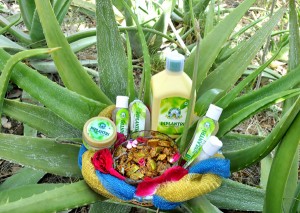
Aloe Vera products from the small scale industries
They plant 111 trees for every girl child who is born, create a fixed deposit of INR 31,000 (approx. USD 620) in her name which attains maturity when she is 18 years old and chalk up a legal agreement between the parents of the girl child and the government that they won’t get their girls married off before she is 18 years old. They also have Aloe Vera industries in which the women of the village are employed. So they have achieved MDGs #3 (promote gender equality and empower women), #4 (reduce child mortality), and #7 (ensure environmental sustainability) at one go. Today on the blog, I would like to introduce Mr. Shyam Sundar Paliwal and his wife, Anita, who were the pioneers of this change action in their village. Anita is 42 years old, and she got married after she finished her 12th grade. It was an arranged marriage and the couple were happy.
Their first daughter Kiran was 18 years old when she passed away. She died due to dehydration. That was the turning point in their life, and they vowed to make lives of others happy.
They also have another daughter Hemanshi (22) and a son Rahul (15) who is in 10th grade. Hemanshi is married and has a child, too.
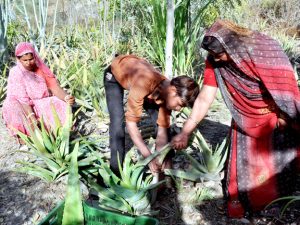
The women of the village tending Aloe Vera
Anita recalls that when she came to her in-laws place after she got married, the first lesson she received from her father-in-law was to plant banana saplings such that they bear fruits during the rainy season and then plant mango saplings around the banana trees. Banana trees absorb water during the monsoon and transfers this water to the mango trees through its roots during the arid summer season. She says she has stuck to this piece of advice to date in her village and ensured that her villagers follow such age-old farming wisdom.
Anita, who is the wife of the ex-sarpanch (ruling political head) of the village, Piplantri, is a very active community member. She is a Zila Parishad Member (Elected person of the district council). Her husband has always been supportive of her as a woman and wants her to do her best for her villagers. He has never restricted her in any way. Though she is more educated than him, he has never been jealous of her, but has only encouraged her and furthered her growth and development as an active member of their society and community. She says, if only all women of the world gets a husband like Shyam, the women of the world will be better off and we would not be speaking of women’s rights here.
Shyam Sundar won the panchayat elections in 2005 and he says he first wanted the people who worked in the government offices to be comfortable. He installed the first AC in the office, brought in some comfortable furniture and ensured that people in all echelons of the society were treated equally. (In rural India, at times, the upper caste people are given more respect and sit on chairs, whereas the lower caste people are treated shabbily and sit down on the floor. Read more about the Evils of Caste system in India here). He said, he worked on the psychology of the ruling body to make them happy and comfortable. He says, only if they are happy, they would start working on reform measures and help provide for the remaining villagers. He, at his own expense, made the offices a comfortable place to work and conducive to provide better results.
He started small. In this difficult water shortage era, he diverted the waste water from all houses/offices towards the fields. Better water conservation was ensured. If waste water does not stagnate anywhere, there would be no mosquitoes and no dengue and fewer diseases. So, he solved primarily problems with simple, cost-effective solutions.
He installed drinking RO water systems in schools. Brought in furniture for the students and made the public schools better than the expensive private schools. People started flocking towards government schools. He raised awareness slowly and in a small way, which evolved out.
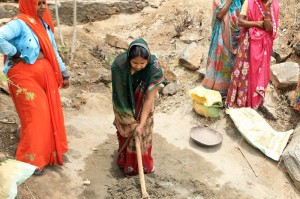
Mrs. Anita Paliwal working on the Water Harvesting Structure
He started rain water harvesting with the help of government. He built canals. He used the women of the village who were unemployed. To the left is a picture of Anita, who at times does not hesitate to get into the fields with a mean sickle. She and her husband were instrumental in starting the water harvesting structure of the village. In most of his welfare activities 90% of the employed are women and 10% alone are men. Women of the village have been blessed indeed to have him there, says Anita. In addition to 25,00,000 Aloe Vera plants, there are 10,000 rose shrubs which are also used in small-scale industries for toiletries and medicinal supplements. Women are employed in all of these schemes.
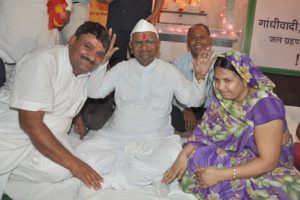
Mr. Shyan Sundar Paliwal and Mrs. Anita Paliwal with Anna Hazare
He started the Kiran Nidhi Yojna with the 76-year-old International Social Activist, Anna Hazare to ensure that no girl child is married off before 18 years old. This man who himself did not study in a college, ensures that all girl children in his village get a college degree. He also nudges the parents to get their girls married off in collective wedding, so that money is conserved and better utilised for other public welfare schemes or for their own savings. This scheme also granted government land to the parents in return for planting 111 trees on the birth of their daughter in that land, and tending to it to fruition before their girl child is 18 years old. On the death of any community member, the family is requested to plant trees again.
He says this again works on their psychology. The girl children treat the trees as their own brothers and sisters. After all, the saplings were planted on the day of their birth. And the parents get emotionally attached to the trees which came into existence on the day their family member was born or died. They then take care of it as a family member, and would under no means cut it down. He says, it is all in the hearts of the people. If people get involved with their hearts, anything is possible. He made people to get emotionally attached to nature and trees and the earth.
I learnt something new from Anita and Shyam that day – Ecofeminism. It is such a beautiful concept. Women and nature have been connected since time immemorial and this couple have harnessed it.
After all, he who was not highly educated could work on such things and make that beautiful village into a heaven, he says, the whole world could change too. And we would have no need to talk about the MDGs or uplifting of any downtrodden society/community.
When asked how he felt when his village was showcased by the Gates Foundation on their Blog, he gushed with happiness and pride. The district collector and Panchayat officials were so excited, too, he said. But his only complaint was that he could not get a hard copy of the magazine which he could show his villagers. He is so proud like a father, like the father of the heaven he created.
He also invites donation to his Kiran Yojna Scheme for the fixed deposit of INR 31000 of every girl child born in his village. He invites the contributors, readers and fans of World Moms Blog to make a trip to Piplantri. He wants people to embrace such change and for them to build upon it to suit their own society, and community.
This is an original post to World Moms Blog by Purnima, our Indian mother writing from Chennai, India. Her contributions to the World Moms Blog can be found here. She also rambles at The Alchemist’s Blog.
Photo credit to Piplantri.com
What do you think about the traditions put in place to support girls and women in the community of Piplantri?

by Alison Fraser | Jul 16, 2013 | 2013, Economy, Human Rights, India, Social Good, World Moms Blog
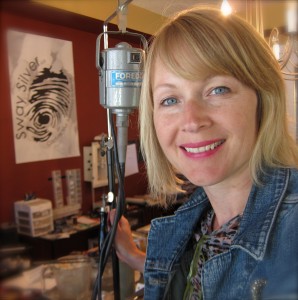
Heather Horsey of Swaysilver jewelry
As we all know, raising children in today’s society can be a financial challenge for many. As mothers, we are often seeking the best deal on the purchases we make. Like many, I do consider myself to be a responsible consumer and I try to purchase from ethical sources.
The recent tragedy in a Bangladesh factory that resulted in the loss of hundreds of lives, however, revealed that some of the stores that I purchase from on a regular basis were in some way or another linked to the poor working conditions of this particular factory.
The majority of those who lost their lives that tragic day were our fellow mothers, working to provide the basis necessities of life to their families.
Those lost in the building collapse have not been far from my thoughts since that day. My appreciation has greatly increased for the companies run by my fellow Canadian moms who I know put the ethical treatment employees as a top priority in their company operations. Peekaboo Beans, Redfish Kids Clothing, KiKi Kids, and Red Thread Design are some of my favourite Canadian brands started and operated by some fabulous Canadian moms.
The success of these businesses lead me to wonder: why can’t all companies choose to manufacture goods in an ethical manner? Isn’t it a fundamental obligation of ours? Why is that for some, despite the obvious financial challenges, this is of such high importance, and yet for many, it is not? In order to address this issue, I decided to speak to a friend and local artisan, who I know has given this very topic much thought and consideration.

Soar bracelet by Heather Horsey
Heather Horsey makes beautiful silver jewellery in my Canadian hometown. She recently designed and marketed a “Teach, Feed, Soar” bracelet benefitting my not for profit organization, Mom2Mom Africa. I asked Heather why she chooses to run her business, Swaysilver, in such an admirable and ethical manner.
Her response was equally as admirable: “It’s no secret that for centuries the jewellery industry has been wrought with social injustices and it’s good to see some headway being made in the ethical production of jewellery by using recycled materials and lab-created gemstones. The metal I use is recycled silver, harvested from catalytic converters from the car manufacturing industry. In my opinion, a lot of good has come out of creating jobs overseas, however, it is in the best interest of everyone to make sure the working conditions are safe and pay is fair”.
It is common knowledge that overseas factories provide a huge cost-savings to many companies, enabling them to provide products to interested purchasers at bargain prices. This is a huge challenge to entrepreneurs, like Heather, who are trying to provide products at a competitive price without compromising ethical standards.
According to Heather, “while bargains are enticing, I’d rather buy from a company that I know is going above and beyond to put caring for people first no matter where the product is being made. Competing in price is a challenge only when it is assumed that I should be able to make by hand something that is quickly made by machine in a factory overseas. I do my best to create designs that are original and artistically interesting in order to set my work apart from something that is mass-produced”.
I truly believe that we need to shift our focus from finding the best possible bargain to instead ensuring that our purchased products are being made in a manner that provides safe and respectable working conditions for employees. I encourage everyone to research the way in which products from your favourite companies are produced. Our actions have a direct impact on the lives of many around the world. It is our moral obligation to help those in need, and not endanger the lives of others in order to benefit ourselves. I encourage you to support local artisans and companies of high ethical standards in your communities.
Saving a few dollars can mean the difference between life and death for others.
As mothers and consumers, we have the power to create change and prevent another needless workplace tragedy.
This is an original World Moms Blog post by Canadian writer and founder of Mom2Mom Africa, Alison Frasier.
Are you conscientious about the ethics and conditions under which the products you purchased are sourced?
Alison Fraser is the mother of three young girls ranging in age from 5 to 9 years old. She lives with her family in Cambridge, Ontario, Canada. Alison works as an Environmental Toxicologist with a human environment consulting company and is an active member of the Society of Environmental Toxicology and Chemistry (SETAC). She is also the founder and director of the Canadian Not for Profit Organization, Mom2Mom Africa, which serves to fund the school fees of children and young women in rural Tanzania. Recently recognized and awarded a "Women of Waterloo Region" award, Alison is very involved in charitable events within her community including Christmas Toy and School Backpack Drives for the local foodbank.
More Posts - Website
Follow Me:



by Nicole Melancon (USA) | Jun 18, 2013 | 2013, India, Social Good, Third Eye Mom, Uncategorized, World Voice
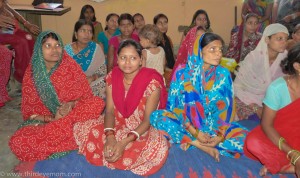
A pregnant mothers group at one of the slums served by Save the Children. Photo By Nicole Melancon
At the end of May I had the honor of traveling to India along with Jennifer James, founder of Mom Bloggers for Social Good, a global coalition of mom bloggers who use our voice through blogging and social media to spread awareness, education and support to the various NGOs around the world that are making a difference.
The purpose of our trip to India was to meet face to face with some of our partner NGOs and see firsthand some of the issues we cover as part of Mom Bloggers for Social Good: Maternal and newborn health, food and water poverty, sanitation issues, and education for women and girls.
Although this was not my first time to India (I had visited India a few years ago as a tourist) it was my first time going in a much different role: As a social good blogger and advocate. Seeing India in a different framework was utterly life changing.
India is perhaps one of the most fascinating places I’ve ever been and with its enormous population, and sensational culture comes issues that are often overwhelming to comprehend. Most people are aware of the huge inequities and poverty strangling India. Although India has seen rapid economic growth over the last decade, the gap between rich and poor has become even wider and more profound. As migrant families leave their villages in rural India and come to the big cities in search for a better life, the growth of urban slums, many in deplorable conditions, continues at unmanageable rates. In just Delhi alone, there are thousands of them. And as almost half a million migrants come to Delhi alone each year, many of them end up populating the already over-crowded urban slums that can be found all throughout the city, even alongside some of Delhi’s most expensive neighborhoods.
Our mission in India was to visit the heart of Delhi’s slums to see the issues firsthand and meet with our partner NGOs who are on the ground and making a difference in people’s lives.
It was not an easy trip. The weather was scorching hot with highs nearing 120 degrees Fahrenheit and visiting an urban slum in itself is heartbreaking and shocking. Although I’ve experienced poverty many times before in my travels I wasn’t prepared for the enormous magnitude of desperation that I found in India.
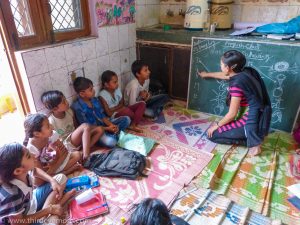
Girls learning at Pratham. Photo by Nicole Melancon
The highlight of our entire trip happened on our first day. We met with a small Indian non-profit organization called Protsahan. Founded by young Indian social entrepreneur Sonal Kapoor, Protsahan, uses a unique approach to teaching and inspiring young, underprivileged girls who come from some of the most tragic circumstances possible. All are poor, and many have been abused and have little opportunity to get an education or a way out of the poverty they were born into. Protsahan, which means “encouragement” uses the arts as a means to inspire, teach and motivate the girls to learn and strive for a brighter future. It was a heartwarming experience meeting Sonal and the girls that were striving to succeed and climb out of poverty. I left wishing we could stay longer. The love and tenderness of Sonal for the girls was overwhelming and made me realize that anyone can make a difference in the world and impact the lives of others.
Our second day was spent visiting another education-focused NGO called Pratham, which is the largest NGO working in India to provide quality education to the country’s millions of underprivileged children. We visited a Hub Center supporting 150 children that was located in a slum in Trilokpuri, East Delhi. The program model was slightly different from Protsahan as the classes were co-ed and also were offered for a minimal, yet affordable fee. Classes began at preschool age and continued on to more advanced English as well as vocational courses. What makes Pratham so unique is its approach to working with the government to create change.
Our final day was spent visiting two big NGOs, Save the Children and WaterAid, where we were able to do two field visits to different urban slums to see their work. In the morning , we visited some of Save the Children’s projects within the Okhla Industrial Area that hosts garment factories, home to over thousands of families living in unauthorized slums. Save the Children provides a variety of services to the slum such as a mobile health van where people can receive basic health care services, medication, and prenatal and newborn health check-ups which is extremely important in cutting maternal and newborn mortality rates. We also attended one of the weekly meetings for pregnant mothers where they are taught the skills needed to ensure their children’s survival.
We ended our day with WaterAid, an NGO that works all over the world to provide safe drinking water and sanitation services.
Ironically, we visited an unauthorized slum built right outside the lush, grand American Embassy.
Unauthorized slums are by far the most devastating places to live. Many do not have running water or sewer systems, which significantly threatens the health and livelihood of the people. At the Vivekanansa slum, we toured one of WaterAid’s Community Toilet Compounds (CTC) which provides safe, clean toilets to the hundreds of families that live in the community. WaterAid operates 78 CTCs all over Delhi as well as CTCs throughout India. The importance of having a CTC cannot be understated. Not only does it provide dignity, it also helps stop serious diseases which kills many children each year.
I left India feeling intense emotions. There were so many enormous issues that at times it was completely overwhelming. Yet, meeting some of the NGOS and people on the ground who are saving lives and making the world a better place, sometimes one person at a time, inspired hope that change can be made.
This is an original World Moms Blog post written by Nicole Melancon of ThirdEyeMom .
Have you been to India, or experienced the juxtaposition of these types of extremes?

Third Eye Mom is a stay-at-home mom living in Minneapolis, Minnesota with her two children Max (6) and Sophia (4). Her children keep her continually busy and she is constantly amazed by the imagination, energy and joy of life that they possess! A world wanderer at heart, she has also been fortunate to have visited over 30 countries by either traveling, working, studying or volunteering and she continues to keep on the traveling path.
A graduate of French and International Relations from the University of Wisconsin Madison, where she met her husband Paul, she has always been a Midwest gal living in Minnesota, Wisconsin and Chicago. This adventurous mom loves to be outside doing anything athletic (hiking, running, biking, skiing, snowshoeing or simply enjoying nature), to travel and volunteer abroad, to write, and to spend time with her beloved family and friends.
Her latest venture involves her dream to raise enough money on her own to build and open a brand-new school in rural Nepal, and to teach her children to live compassionately, open-minded lives that understand different cultures and the importance of giving back to those in need. Third Eye Mom believes strongly in the value of making a difference in the world, no matter how small it may be. If there is a will, there is a way, and that anything is possible (as long as you set your heart and mind to it!).
Visit her on her blog, Thirdeyemom, where she writes about her travels and experiences in other lands!
More Posts
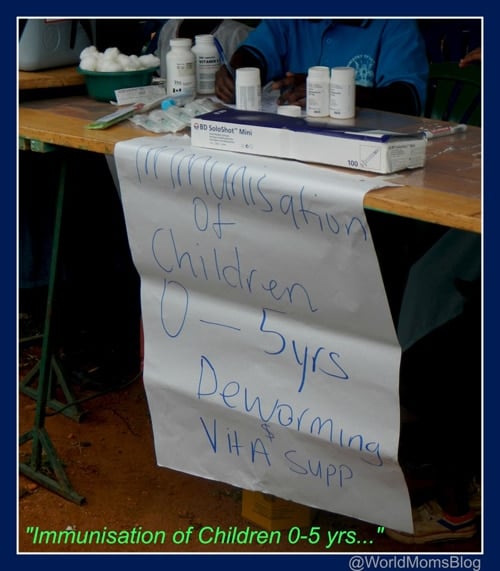
by Purnima Ramakrishnan | Apr 26, 2013 | Communication, Health, India, International, Interviews, Motherhood, Parenting, Poverty, Purnima, Social Good, Social Media, The Alchemist, Uganda, Vaccines, World Moms Blog, World Motherhood, World Voice, Younger Children
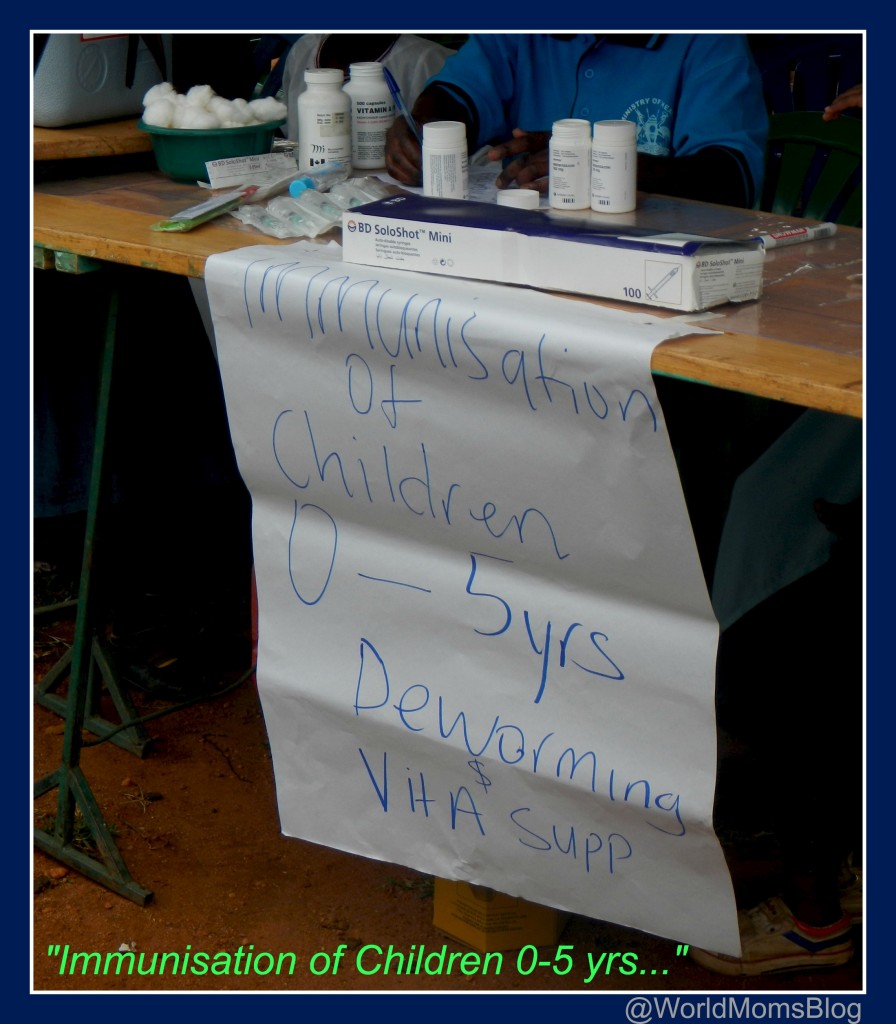 This post is a continuation of the interview with Dr. V.R. Purushotham that ran on Tuesday, April 23rd.
This post is a continuation of the interview with Dr. V.R. Purushotham that ran on Tuesday, April 23rd.
In an effort to better understand health care services in India and help expand public awareness, World Moms Blog Senior Editor, Purnima, has interviewed several physicians. The first in this series is an interview with Dr. V. R. Purushotham, a pediatrician in Bangalore, India, and is being run during World Immunization Week. He is consulting in St.John’s Medical College, Bangalore.
Purnima Ramakrishnan: What are some of the most pressing health concerns for children where you work?
Dr. V.R. Purushotham: The primary concerns are anemia, malnutrition and infections as these are major causes of poor growth and mortality in the community.
PR: What is the socioeconomic level of the area you work in? Are the families of the children rich, poor, middle class, etc.?
Dr. P: Being a referral hospital we see children from a varied strata but a majority are from a weaker socioeconomic level.
PR: What is your opinion on the alleged link between vaccines and autism, and how do you answer parents who come to you with those concerns?
Dr. P: There have been enough scientific studies to confirm that MMR vaccine is not associated with autism. The timing of the vaccine was a major reason as to why it was implicated. Previous scientific papers stating their association have been refuted. My view is that the damage caused by measles, mumps and rubella is far more than an unlikely association which is unproven.
PR: What is the biggest obstacle in India for all children to receive routine vaccinations? – Government policy? Financial resources? Supply of vaccines? Access to healthcare facilities? Trained practitioners? Geographical barriers/lack of infrastructure to reach rural areas? Cultural beliefs about vaccines?
Dr. P: The obstacles are multifactorial, but financial constraints and infrastructure would be the major ones. Community education initiatives have helped in this regard too and we are gradually seeing a positive change towards improved healthcare.
PR: And what could help overcome those obstacles the most? Political influence? Foreign resources? Medical staff training? Communication/Awareness campaign?
Dr. P: Better awareness and door to door coverage services would help us overcome these barriers .
PR: As far as you have followed World Moms Blog, do you think WMB has been making an impact in improving the vaccination and immunisation awareness in India? Or do you think blogs and internet do not reach those socio economic echelons where people do not adhere to vaccinations? And if so, how do you think WMB can help bridge the gap?
Dr. P: Any forum which discusses and promotes health from the grassroots in a positive manner is playing a constructive part in the society and WMB is one of them. Having said that, it is the personal and community based initiatives which tend to have a larger impact. I concur that the population with access to blogs would be well aware of the basic requirements of vaccination .
The fact is that you are and will make a difference to the people who do read WMB and I would urge you to keep up the good work.
This post is the first in a series of interactions with physicians and health care workers in India by Purnima Ramakrishnan on behalf of the World Moms Blog.
This is an original post to World Moms Blog by The Alchemist, our Indian mother writing from Chennai, India. Her contributions to the World Moms Blog can be found here. She also rambles at The Alchemist’s Blog.
The photograph in this post is credited to Jennifer Burden and was taken at a UNICEF Family Health Day in Kampala, Uganda, where children were being immunized in October 2012.
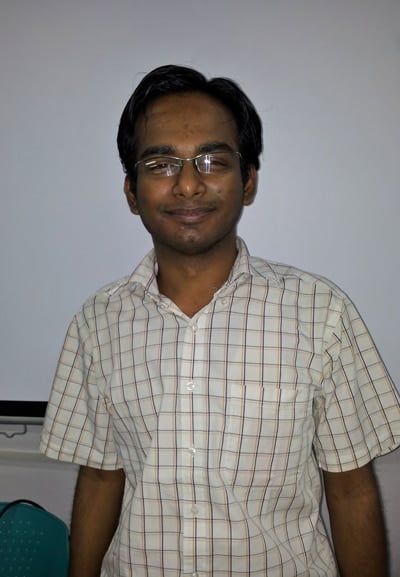
by Purnima Ramakrishnan | Apr 23, 2013 | India, Interviews, Motherhood, Purnima, Social Good, The Alchemist, Vaccines, World Moms Blog, World Motherhood, World Voice
This is the first in a two-part Interview. In an effort to understand health care services in India better and to help expand public awareness, World Moms Blog Senior Editor, Purnima, has interviewed a few physicians. The first in this series is an interview with Dr. V. R. Purushotham, a pediatrician in Bangalore, India. He is consulting in St.John’s Medical College, Bangalore.
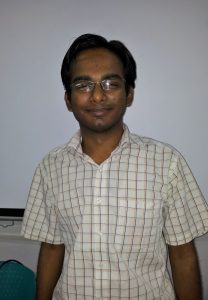
Dr. V. R. Purushotham
Purnima Ramakrishnan: How many cases do you come across on an average everyday and out of that how many sick children recover and get healthy again?
Dr. Purushotham: At the outset, I am extremely happy and honored to be associated with an initiative like this which caters to the needs of mothers all along the globe. It is my belief that a caring and loving mother is the strongest immunity which a child can get and there is scientific evidence in support of that.
I work in a tertiary care hospital in Bangalore which caters to a large population of children both in and around the city and serves as a referral centre for about 300 sq.kms. Having specialized intensive care units we do see a good number of sick children daily and 90-95% recover well.
PR: Out of the sick children, how many or what percentage are those which could have been prevented by vaccine?
Dr.P: A good chunk of diseases which we come across are infections which affect the lungs( pneumonia), Brain( meningitis) and diarrhea. The introduction of vaccines has reduced the incidence of these diseases but cost being a limiting factor in India, the number of children who have received all the vaccines are a small population of them. (more…)




















 This post is a continuation of the interview with Dr. V.R. Purushotham that ran on Tuesday, April 23rd.
This post is a continuation of the interview with Dr. V.R. Purushotham that ran on Tuesday, April 23rd.




